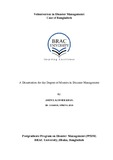| dc.contributor.advisor | Rahman, Dr. Mizanur | |
| dc.contributor.author | Khan, Aminul Kawser | |
| dc.date.accessioned | 2018-12-12T07:45:08Z | |
| dc.date.available | 2018-12-12T07:45:08Z | |
| dc.date.copyright | 2018 | |
| dc.date.issued | 2018 | |
| dc.identifier.other | ID 13168010 | |
| dc.identifier.uri | http://hdl.handle.net/10361/11013 | |
| dc.description | This dissertation is submitted in partial fulfillment of the requirements for the degree of Master in Disaster Management, 2018. | en_US |
| dc.description | Cataloged from PDF version of dissertation. | |
| dc.description | Includes bibliographical references (page 21). | |
| dc.description.abstract | Volunteering is generally considered as an altruistic activity and is intended to promote good or improve human quality of life. In return, this activity produces a feeling of self-worth and respect; however, there is no financial gain. Volunteering is also renowned for skill development, socialization, and fun.
Volunteering is defined as any activity that involves spending time, unpaid, doing something that aims to benefit the environment or someone (individuals or groups) other than, or in addition to, and close relatives. Central to this definition is the fact that volunteering must be a choice freely made by everyone. This can include formal activity undertaken through public, private and voluntary organizations as well as informal community participation.
Volunteerism engages people in tackling disaster preparedness and response challenges. It transforms the pace and nature of development. It benefits communities and country at large. It strengthens trust, solidarity and reciprocity of an individual among people. It creates opportunities for participation.
In Bangladesh, the idea or the initial starting phase of an organization or movement is done in a wholesome volunteered way, but it is very weak in documentation/institutionalization, due to this reason it is challenging to keep the voluntary initiative sustainable.
For centuries volunteerism has evolved in a natural manner, shifting and changing shape in response to other shifts in culture, society, and notions of social responsibility. Over time, volunteerism had become deeply entrenched in life. Now it is the time to study the volunteerism methodically.
The nature of volunteering has always been shifting. At one point it was almost exclusively unorganized. People were just helping their neighbours and family members as needed. The poor availability of documentation regarding volunteerism is why it is only now that people in Bangladesh are starting to identify the scope of work and the uniqueness of volunteerism in the field of Disaster Risk Management especially more so in the communities. Therefore, this study is intended to investigate the feasibility of incorporating the concept of volunteerism in mainstreaming disaster response in Bangladesh. | en_US |
| dc.description.statementofresponsibility | Aminul Kawser Khan | |
| dc.format.extent | 21 pages | |
| dc.language.iso | en | en_US |
| dc.publisher | BRAC University | en_US |
| dc.rights | BRAC University dissertations are protected by copyright. They may be viewed from this source for any purpose, but reproduction or distribution in any format is prohibited without written permission. | |
| dc.rights | BRAC University dissertations are protected by copyright. They may be viewed from this source for any purpose, but reproduction or distribution in any format is prohibited without written permission. | |
| dc.subject | Disaster management | en_US |
| dc.subject | Volunteerism | en_US |
| dc.subject.lcsh | Natural disasters--Bangladesh. | |
| dc.subject.lcsh | Emergency management. | |
| dc.title | Volunteerism in disaster management: case of Bangladesh | en_US |
| dc.type | Dissertation | en_US |
| dc.contributor.department | Department of Architecture, BRAC University | |
| dc.description.degree | M. Disaster Management | |

